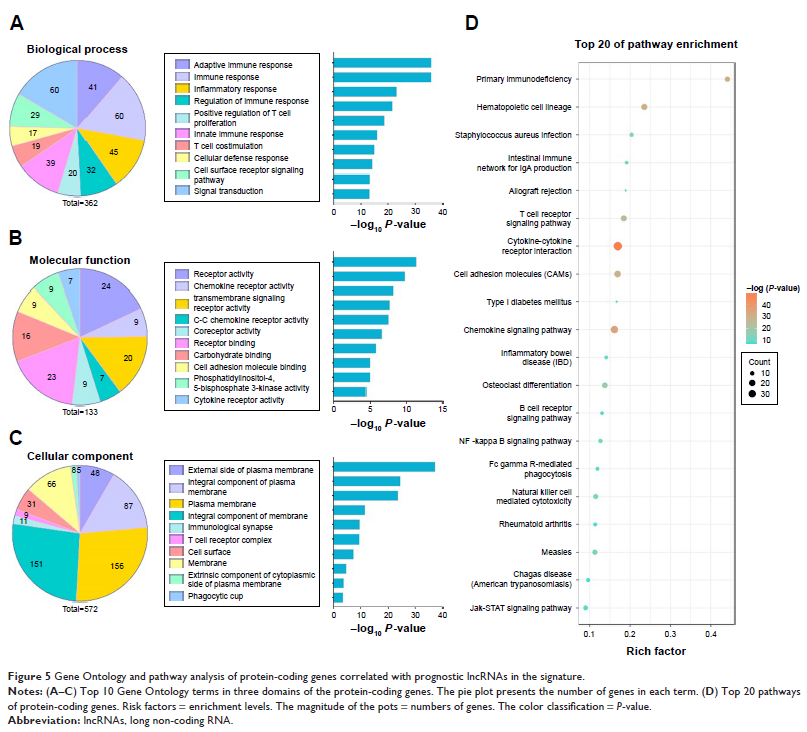108384
论文已发表
注册即可获取德孚的最新动态
IF 收录期刊
- 3.4 Breast Cancer (Dove Med Press)
- 3.2 Clin Epidemiol
- 2.6 Cancer Manag Res
- 2.9 Infect Drug Resist
- 3.7 Clin Interv Aging
- 5.1 Drug Des Dev Ther
- 3.1 Int J Chronic Obstr
- 6.6 Int J Nanomed
- 2.6 Int J Women's Health
- 2.9 Neuropsych Dis Treat
- 2.8 OncoTargets Ther
- 2.0 Patient Prefer Adher
- 2.2 Ther Clin Risk Manag
- 2.5 J Pain Res
- 3.0 Diabet Metab Synd Ob
- 3.2 Psychol Res Behav Ma
- 3.4 Nat Sci Sleep
- 1.8 Pharmgenomics Pers Med
- 2.0 Risk Manag Healthc Policy
- 4.1 J Inflamm Res
- 2.0 Int J Gen Med
- 3.4 J Hepatocell Carcinoma
- 3.0 J Asthma Allergy
- 2.2 Clin Cosmet Investig Dermatol
- 2.4 J Multidiscip Healthc

用于预测宫颈癌患者预后的长链非编码 RNA(共 10 个)的特征
Authors Shen L, Yu H, Liu M, Wei D, Liu W, Li C, Chang Q
Received 23 May 2018
Accepted for publication 20 August 2018
Published 28 September 2018 Volume 2018:11 Pages 6317—6326
DOI https://doi.org/10.2147/OTT.S175057
Checked for plagiarism Yes
Review by Single-blind
Peer reviewers approved by Dr Cristina Weinberg
Peer reviewer comments 2
Editor who approved publication: Dr Arseniy Yuzhalin
Purpose: The aim of the present study was to construct a novel long non-coding RNA (lncRNA) signature to predict the prognosis of patients with cervical cancer (CC).
Materials and methods: We downloaded lncRNA expression profiles and clinical characteristics from The Cancer Genome Atlas database and randomly divided them into a training dataset (n=200) and a testing dataset (n=87). Using a Cox-based iterative sure independence screening procedure combined with a resampling technique, a lncRNA signature was calculated from prognostic lncRNAs in the training dataset and was independently verified in the testing and the entire datasets. In addition, multivariate Cox regression and further stratified analyses were performed, taking into consideration the lncRNA signature as well as other clinical characteristics. Finally, we predicted the underlying functional effects of the prognostic lncRNAs by using Gene Ontology and Kyoto Encyclopedia of Genes and Genomes pathway enrichment analyses.
Results: We constructed a promising ten-lncRNA signature that was significantly associated with the prognosis of CC on the basis of a risk score formula. The risk score was used to classify patients into high-risk and low-risk groups with different overall survival in the training dataset, and was confirmed in the testing and entire datasets. Compared with the clinical factors, the ten-lncRNA signature was found to be an independent prognostic indicator and displayed robust prognostic performance. A functional analysis indicated that these ten lncRNAs were enriched in immune response, cell adhesion molecules and nuclear factor kappa B signaling.
Conclusion: Our results demonstrated that this ten-lncRNA signature may serve as a prognostic biomarker for patients with CC.
Keywords: cervical cancer, long non-coding RNAs, survival, prognosis signature
